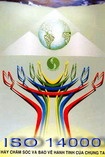The plan calls, for different economic sectors, businesses and public communities to co-operate in environmental protection programmes to alleviate the Government's budget burden and increase the efficiency of environmental services.
According to the plan, environmental protection work will be extended to private businesses, joint stock companies and co-operatives.
Even foreign businesses are encouraged to invest in building infrastructures for the treatment of environmental pollution in industrial production sectors and wastewater treatment.
The ministry will also co-operate with the Finance Ministry to provide VND3,500bil (US$218mil) for environmental protection programmes nation-wide in 2007.
More funding will be provided by the Environmental Protection Fund, now worth VND200bil ($12,5mil). It is expected that this capital will increase after the collection of the wastewater bill.
International funding is also a major contributor to environmental efforts in Vietnam. Several foreign donors have said they will earmark 15-20% of official development assistance funding for environmental protection programmes.
In addition, regulations on environmental taxes, environmental protection fees, and deposits for the Environmental Protection Fund will be perfected in the near future.
This will help businesses engaging in environmental protection services develop sustainable production and business plans.
According to environmentalists, Vietnam's admission to the WTO will create favourable conditions for improved co-operation between environmental services both at home and abroad.
Environmental protection services vital to Vietnam include treatment of waste water and solid waste, reducing gas emission pollution and the reduction of noise, as well as preservation of natural resources.
Higher standards
Ngo Van Nhon, secretary general of Viet Nam Quality Association of HCM City, has urged domestic enterprises to apply the ISO (International Standard Organisation) 14000 system to produce environmentally sound products in line with WTO entry.
He said that about 100 enterprises had been granted ISO 14000 certification, but nearly 70% of them are foreign – invested companies.
Compared with the average world rate, the number of Vietnamese enterprises that have been granted ISO 14000 was as low as one in one thousand.
He blamed the low rate on local enterprises' unawareness of the importance of the application of IS014000 when the country fully joins the WTO.
Most Vietnamese enterprises are small and medium sized without the financial capacity to implement the IS014000 system.
He also proposed that Government assist domestic enterprises to implement the international standard system on environmental management by providing them with support and technical consultation to facilitate entry into the world trade body.
